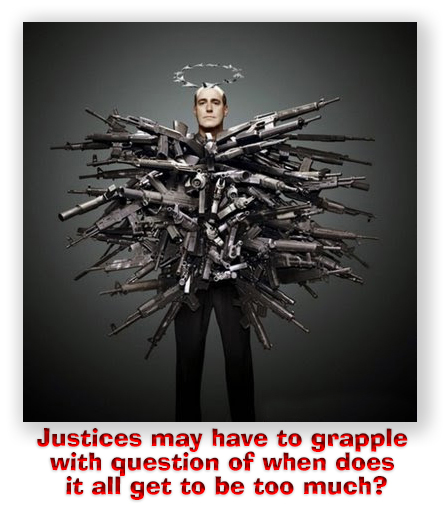We post news and comment on federal criminal justice issues, focused primarily on trial and post-conviction matters, legislative initiatives, and sentencing issues.

CHRISTMAS SEASON AT THE SUPREME COURT
 We’re entering what I always think of as Christmas season at the Supreme Court, the final 10 weeks of what is anachronistically called “October Term 2023.” With 75% of the Court’s term done, only about 24% of its opinions have been issued. That’s common: there’s always a flurry of decisions issued in late April, May and June, with the most controversial decisions saved for last.
We’re entering what I always think of as Christmas season at the Supreme Court, the final 10 weeks of what is anachronistically called “October Term 2023.” With 75% of the Court’s term done, only about 24% of its opinions have been issued. That’s common: there’s always a flurry of decisions issued in late April, May and June, with the most controversial decisions saved for last.
The most consequential criminal case yet to be decided, I believe, is United States v. Rahimi. In 2022, the Supreme Court in N.Y. State Rifle & Pistol Assn. v. Bruen – relying on the Second Amendment – invalidated a New York law that forbade individuals to carry a gun in public unless they could persuade a government official that they faced some extraordinary threat to their personal safety. Applying “originalism,” the judicial philosophy that legal text should be interpreted based on the original understanding at the time of adoption, SCOTUS reasoned that a right reserved to a tiny subset of the population (the right to carry a gun) was an encroachment on a “right of the people” that the Constitution says “shall not be infringed.”
But Bruen reaches further, holding that when defending a law that deprives an individual of the freedom to keep or bear arms, the government must show that the law “is consistent with the nation’s historical tradition of firearm regulation.” The absence of a historical regulation “distinctly similar” to a modern gun-control law is evidence of the modern regulation’s unconstitutionality.
Laws banning all felons from gun possession were not adopted until the 1960s.
In Rahimi, the 5th Circuit applied the Supreme Court’s Bruen decision, holding that 18 USC § 922(g)(8) – which prohibited people subject to domestic violence protection orders from possessing guns – violated the Second Amendment because, at the time the Second Amendment was adopted, no law keeping people subject to a domestic violence protection order was on anyone’s books.
 Writing last week in the New York Times, George Mason University law professor Nelson Lund said, “Under Bruen’s originalist test, Rahimi should be an easy case. The government has not informed the Supreme Court of a single pre-20th-century law that punished American citizens, even those who had been convicted of a violent crime, for possessing a gun in their own homes. Not one.”
Writing last week in the New York Times, George Mason University law professor Nelson Lund said, “Under Bruen’s originalist test, Rahimi should be an easy case. The government has not informed the Supreme Court of a single pre-20th-century law that punished American citizens, even those who had been convicted of a violent crime, for possessing a gun in their own homes. Not one.”
The problem is that the subject of the Rahimi case, Zackey Rahimi, is an awful defendant. His ex-girlfriend obtained a domestic violence protection order against him on the ground that he had assaulted her, and he has been charged with several crimes involving the misuse of firearms, including shooting up a What-a-Burger when his friend’s credit card was declined.
“If the court pretends that a historical tradition of such laws existed,” Lund wrote, “it will not be faithful either to Bruen’s holding or to the court’s repeated insistence that the right to keep and bear arms is not ‘a second-class right, subject to an entirely different body of rules than the other Bill of Rights guarantees.’”
But following the Bruen precedent could be tough on the Justices, because the outcry of letting the Zack Rahimis of the nation keep their guns will be fierce. Still, Rahimi may have a silver lining for the § 922(g)(1) felon-in-possession statute. If Zack wins, that just about guarantees that Garland v. Range – in which the 3rd Circuit ruled that Bruen means that a guy convicted 25 years before of a minor food stamp fraud is allowed to possess a gun – will be upheld. If Zack loses, I suspect SCOTUS will write some “dangerousness” exception into the Bruen standard. Even if that happens, many § 922(g)(1) defendants will easily jump that hurdle.
 Writing in his Sentencing Law and Policy blog last week, Ohio State University law prof Doug Berman said, “In the votes and voices of a number of Justices (and others), I sometimes notice that affinity for originalism starts running out of steam when the outcomes start running in concerning directions. Rahimi may prove to be another data point on that front in the coming months.”
Writing in his Sentencing Law and Policy blog last week, Ohio State University law prof Doug Berman said, “In the votes and voices of a number of Justices (and others), I sometimes notice that affinity for originalism starts running out of steam when the outcomes start running in concerning directions. Rahimi may prove to be another data point on that front in the coming months.”
United States v. Rahimi, Case No. 22-915 (Supreme Ct, argued November 7, 2023)
New York Times, The Fidelity of ‘Originalist’ Justices Is About to Be Tested (April 9, 2023)
Sentencing Law & Policy, Is Rahimi an “easy case” for any true originalist to rule for the criminal defendant and against the prosecution? (April 10, 2024)
– Thomas L. Root













